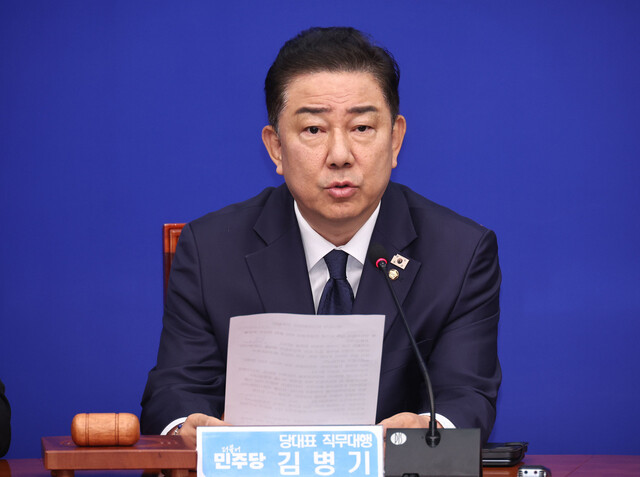Expressed Willingness to Proceed Unilaterally Amidst Stalled Negotiations,

Kim Byung-ki, acting representative and floor leader of the Democratic Party, speaks at the party’s top committee meeting at the National Assembly on the 4th.,
, ‘On the 4th, Kim Byung-ki, acting president and floor leader of the Democratic Party, announced, “We will pass the supplementary budget bill, which will serve as a primer for the recovery of people’s livelihoods, in today’s plenary session.” Although negotiations on the supplementary budget between the opposition parties broke down in the early morning at the National Assembly’s Special Committee on Budget and Accounts, Kim expressed his intention to convene the plenary session and proceed with the supplementary budget bill unilaterally.’,
,
, ‘During the top committee meeting at the National Assembly in the morning, Acting President Kim said, “The situation where the bipartisan agreement on the supplementary budget for people’s livelihoods is being nullified due to the People Power Party’s breach of promise is regrettable,” adding, “The actions of the People Power Party, which blocked state affairs by rejecting the prime minister’s endorsement, and now seems to be hindering the people’s welfare, are truly disappointing.” He pointed out, “Even now, precious time for the recovery of the people’s economy is slipping away,” and urged the People Power Party to reflect and make a decisive action.’,
,
, ‘Before the meeting, Min Jin-seok, deputy floor leader of the Democratic Party, told reporters, “The negotiation (on the supplementary budget) has broken down,” and stated, “The plenary session called for at 2 PM for the budget processing will proceed.” This indicates the plan to process the supplementary budget bill even if the opposition party boycotts the plenary session.’,
,
, ‘The ruling and opposition party members of the National Assembly’s Budget Committee continued negotiations on the supplementary budget into the early morning but could not close the gap on differing positions. Deputy Floor Leader Min mentioned that the main points of contention were the targets for the livelihood recovery consumption coupons and the ratio of government support, which were not resolved. The government proposed a plan where it would bear 80% and local governments 20% of the costs for issuing the consumption coupons, but the Democratic Party argued for reducing the burden on local governments. “The People Power Party wanted to use that funding for their policy projects, leading to ineffective negotiations,” Min explained.’,
,
, ‘As a result, with the central government’s burden ratio increasing and the Democratic Party’s plan to provide additional consumption coupons to residents in non-metropolitan areas (30,000 KRW) and depopulating areas (50,000 KRW), the supplementary budget is expected to increase by approximately 2 trillion KRW more. Deputy Floor Leader Min stated, “The People Power Party found it difficult to agree, especially since the budget increase is substantial.”’,
,
, ‘During the early morning negotiations, there was also a difference of opinion between ruling and opposition parties on the “special activity expenses” (SPE) of the presidential office, which the Democratic Party suggested increasing. However, Deputy Floor Leader Min said, “The major hurdle in the negotiations was the matching ratio of the consumption coupons, and the issue of the SPE was secondary,” indicating that no specific discussion occurred beyond acknowledging existing differences.’,
,
,

